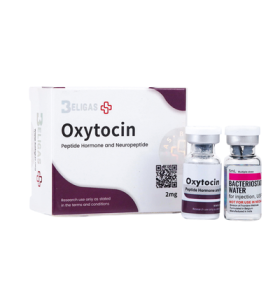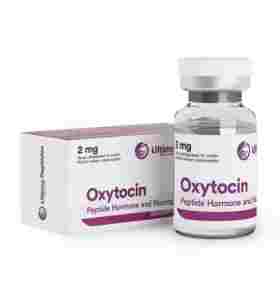Oxytocin Category Products
Oxytocin, is as known as the "love hormone" or the “cuddle hormone,” is an important neurotransmitter and a powerful hormone made in your hypothalamus and secreted from your pituitary gland. Its Functions to emotional bonding, responses and empathy, sexual physiology of reproduction in humans through childbirth (i.e. lacation) and nurturing behaviorsence Oxytocin for the sexes of love, because its abundance quantity parameters that are far from their effects on human behavior and physiology Loremagnitude, so before "life" oxytocin is also known as childbirth (pain-suppressing activity); lactation tech having multiple cholinergics".
What is Oxytocin?
Oxytocin is a nonapeptide hormone.
Nonapeptide means it consists of nine amino acids together making oxytocin as one tenth of the peptide chain has already been used in connecting all 9 component peptides.
It functions as both a hormone and neuromodulator in the brain that controls several body processes.
This hormone is easily released with light touch and physical contact, hugs or sexual activity ,or whenever we give birth.
Oxytocin is also responsible for labor contractions and milk-ejection, it promotes lactation by moving shares of breast tissue into a position where they can be better accessed through another letdown reflex.
Oxytocin and Connection(flowchart)
Romantic Bonds
Oxytocin is commonly referred to as the “love hormone” and seemed poised for romance in early human studies. Intimacy such as hugging, kissing the brain secretes oxytocin which goes a long way to increase partner bonding. It deepens a sense of intimacy and love, which in turn assists couples to feel more attached thereby enhancing emotional closeness.
Parent-Child Relationships
Oxytocin is also very important to form bonds between parents and children, particularly mothers with newborns. Oxytocin is released in large doses when a woman gives birth causing uterine contractions and helping to facilitate the delivery. After a baby is born, oxytocin helps make moms fall in love with their new infant and creates the bond mother needs to have for her child. Breastfeeding releases oxytocin, and help mothers to bond with the chils emotionally.
Friendship and Social Connections
Oxytocin is not exclusively relevant for love and family ties, but also contributes to friendships and social encounters. This hormone induces trust and bonding, which helps people form social relationships. To help facilitate bonding, people produce more oxytocin to experience even social connection and thus overall holistic satisfaction, building trust that makes them feel less threatened by others.
Health Benefits of Oxytocin
1-Stress Reduction
Oxytocin has been found to combat stress by minimizing the release of cortisol, which is known for being produced and released into our bloodstream when we are stressed out. High levels of oxytocin correlate with lower anxiety and a greater ability to calm down.
2-Promotes Trust and Empathy
One of the best-known effects is trust and empathy, Oxytocin enhances human bonding by increasing social trust and cohesion, bolstering our ability to respond empathically with one another while working together toward common goals. This makes it a vital tool for creating well-being in relationships, be they personal or professional.
3-Pain Relief
Additionally, oxytocin is naturally an analgesic, meaning that it has painkilling effects. For example, during childbirth oxytocin regulates uterine contractions as well reduces the agonizom pain experienced by the mother throughout delivery process. Furthermore, physical touch such as a hug or embrace has been shown to lessen the perception of pain and discomfort however due in part largely because it releases oxytocin.
4-Role in Reproductive Health
Oxytocin is essential for reproductive health — and especially so in women. As a result, it causes uterine contractions during childbirth to help in the process of delivery and even after birth, when needed for milk ejection. Oxytocin is also purported to play a role in sperm movement and production in men. The function of oxytocin in reproduction emphasizes the vital role it plays as a modulator contributing to both sexual and reproductive health.
Clinical Uses of Oxytocin
Since oxytocin is responsible for modulating mood, social items and emotional performance many studies are conducted to explore its possible therapeutic applications.
Medical studies are underway to determine whether oxytocin may be helpful in treating autism spectrum disorder, social anxiety, depression and post-traumatic stress disorder (PTSD), among other conditions.
For instance, studies have shown that oxytocin can increase social cognition and communication in individuals with autism , which should improve their abilities to deal with various societal situations.
The anxiolytics and trust-supporting properties of oxytocin have created a role for it in the therapy of social function disorders such as autism, which could theoretically be extended to aid psychological conditions.
Conclusion
oxytocin is not simply the "love hormone." Well it emotionally helps in the sense of emotion improvement, increase social bonding & even physical health. It is a very exciting topic for research with therapeutic potential, and an everyday necessity as stress has to be managed in our daily lives. In short, Oxytocin Plays a Role in Improving Our Emotional & Social Health – To Lead to A Better Life.
FAQs
1. What is oxytocin?
Oxytocin — the love hormone, cuddle chemical, or bliss molecule according to what circles you travel in, is a hormone and neurotransmitter that is active at times of social bonding (e.g. orgasms), its release controlled by programmed circuits.
2. So why would oxytocin affect relationships?
This supports confidence and empathy, friendship that builds relationships romantically as well a socially.
3. Can oxytocin reduce stress?
Oxytocin reduces stress by inhibiting the production of cortisol, which in turn can help lower levels of anxiety and produce a sense of calm.
4. How do I increase oxytocin naturally?
You can raise oxytocin through physical touch, altruism (acts of kindness), exercise and relaxation techniques like meditation.
























